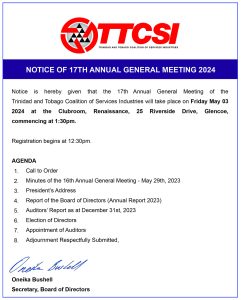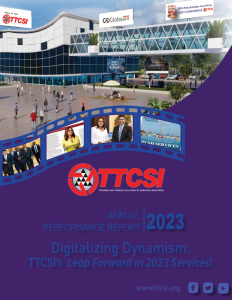Introduction to TTCSI
The Trinidad and Tobago Coalition of Services Industries (TTCSI) was launched in October 2006 following the formation of a private sector/public sector Task Force that was responsible for its establishment. It was made into an operational institution in April 2007 and established as a national umbrella body that brings together all private sector services associations.
Our mission statement mandates that TTCSI monitor and assess the global business environment, facilitate and assist the local services sector to become increasingly competitive internationally, to contribute to the development and growth of the national economy.
TTCSI currently comprises 27 Association representing a diverse services sector. Its membership covers over 50% of the services sector and includes all of the financial, energy, construction and marine services industries among others.
An elected Board of seven Directors governs the Coalition and its work is implemented by a Secretariat of paid professionals, who work towards full time representation, advocacy and the overall development of the trade in services sector.
TTCSI serves to assist in trade negotiations and to strengthen the local private sector to face the challenges and opportunities arising from decisions taken at the WTO, the CSME and other trading arrangements.
Proposal
The TTCSI considers itself to be the natural vehicle for the implementation of the Government’s diversification initiative. The service sector already represents about 55% of the GDP of the country and is, by far, the largest employer in the country. Statistics on exporting are not reliable for a number of internal and external reasons but it clear that the sector should be a more significant contributor to export earnings for the country than the currently estimated level of 10-15% of total exports.
Laying the groundwork for that growth could make the deepest and most enduring contribution to the development of the services sector and thus the diversification of the economy. Essentially this relates to creating the environment that enables the businesses in the sector to function effectively. This environment would be characterised by three major aspects: –
• a strong domestic regulatory framework with modern rules to both guide the practice of service providers and provide protection to the consumer. Studies have also shown that such an framework also provides comfort to prospective foreign purchasers of services;
• provision of appropriate incentives to services sectors. While some specific differentiation depending on the sector concerned could be appropriate, the simplest and most efficient approach could be to provide broad, generally available support that could be appropriate or adaptable for the sector as a whole
• Development of a policy framework for services exporting, including the identification of public sector support for exporting activity, markets of particular interest, priorities within the markets, institutional support domestically and in international markets.
Regulatory Framework
In light of the commitment to the creation of the Caribbean Single Market and Economy (CSME), there must be recognition of the necessity to conceive of the regional market as the domestic market. Certainly, the control of the regional regulatory framework would be less than the national market. However, a commitment must be made to seek to ensure as far as possible concordance between regional rules on services trade and the renewed domestic regulatory framework.
There must be developed a regulatory environment that is much more stable, mandatory, modern and protective of the consumer (national and foreign). It should not be possible for one to declare oneself a service provider, sell those services without operating within an ordered framework or in the absence of suitable legal rights or responsibilities. Critical as well, would be the commitment of public authorities to adhere scrupulously to the rules and regulations that are proscribed. Joint Committees of representatives of the sector concerned and the public sector should develop such regulations. The Trinidad and Tobago Coalition of Services Industries commits itself to function as the facilitator for such Joint Committees.
In the context of the above, the TTCSI respectfully suggests that Government could commit itself to the establishment of five (5) such Committees with the first quarter of the new financial year. Broadly, these Committees could be grouped in the following manner :-
• Infrastructure – Transportation, Telecommunications, Finance
• Tourism, Sporting and Cultural
• Professional
• Personal – e.g. Spas, Fashion
• Health and Education
The target should be to complete regulations for 2 services sub-sectors in each area by the end of the upcoming budgetary period. In some cases, the regulations would require entirely new legal instruments. In others, there could simply be updating of existing legal instruments.
Incentives
In considering the appropriate incentive framework for services it is important to note that Trinidad and Tobago is not constrained by any treaty obligation. The General Agreement on Trade in Services (GATS), part of the Agreement establishing the World Trade Organization, contains no disciplines regarding subsidies but commits to the future development of same. In the years since the establishment of the WTO no such common international disciplines have been agreed.
As an overall approach, the Government should seek to develop incentives that are broadly applicable throughout the services economy. Furthermore, these incentives should be linked the achievement of certain performance indicators to be mutually agreed. Incentives to be developed should seek to support the activities of service providers in the following areas:
• Enterprise Capacity-building
• Enhancing technological implementation
• Innovation
• Research and Development
• Adherence to new regulatory requirements
• Export Promotion and new market development
In the upcoming budget presentation, it is recommended that the Government indicate its intention to work with the sector to develop such an incentive framework. It could indicate commit to complete such a framework within the coming financial year. The institutional framework for completing this could be Sub-Committee of the Economic Development Board.
Policy
The TTCSI is aware that work has commenced on a services trade policy in the Ministry of Trade and Industry. Such a policy would be the first of its type in the Caribbean. To date, however the consultation mechanisms have not functioned to the extent necessary or desirable. There is therefore a need to recommit to the development and implementation of such a policy within the next year.
We also look forward to the completion in the upcoming year, with the appropriate consultation with and input from stakeholders, of a National Export Policy.





